#mary roach
Text
This week's deep dive rec is a book by Mary Roach, one of my favorite nonfiction authors, who has a knack for imparting a lot of deeply researched information conversationally and accessibly. Stiff: The Curious Lives of Human Cadavers goes deep into what happens after we die (very specifically, what happens to our bodies?):
For two thousand years, cadavers—some willingly, some unwittingly—have been involved in science’s boldest strides and weirdest undertakings. They’ve tested France’s first guillotines, ridden the NASA Space Shuttle, been crucified in a Parisian laboratory to test the authenticity of the Shroud of Turin, and helped solve the mystery of TWA Flight 800. For every new surgical procedure, from heart transplants to gender confirmation surgery, cadavers have helped make history in their quiet way. Stiff investigates the strange lives of our bodies postmortem and answers the question: What should we do after we die?
(If you're not sure if this book will be too grisly for you, check the list of topics covered and let that be your vibe check.)
#wednesday deep dives#mary roach#I read a couple sections through my fingers but overall it was just really interesting info#it's always wild to read about how human attitudes towards death evolve and a lot of that gets wrapped up in cadavers#and I had no idea how broad the range ''donating your body to science'' covered
51 notes
·
View notes
Text

I’m officially behind on my “one nonfiction book per month” goal
#i blame this book#it’s not bad it’s just disjointed which makes me slow#fuzz#mary roach#nonfiction#nonfiction books#booklr#books#book#read#reading#reader#bookish#mine#bookblr#bookworm#library#library book#cats and books#cats of booklr
30 notes
·
View notes
Text
I implore everyone to read Fuzz by Mary Roach, especially the footnotes
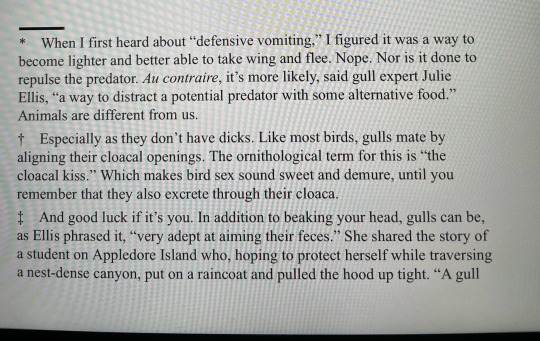
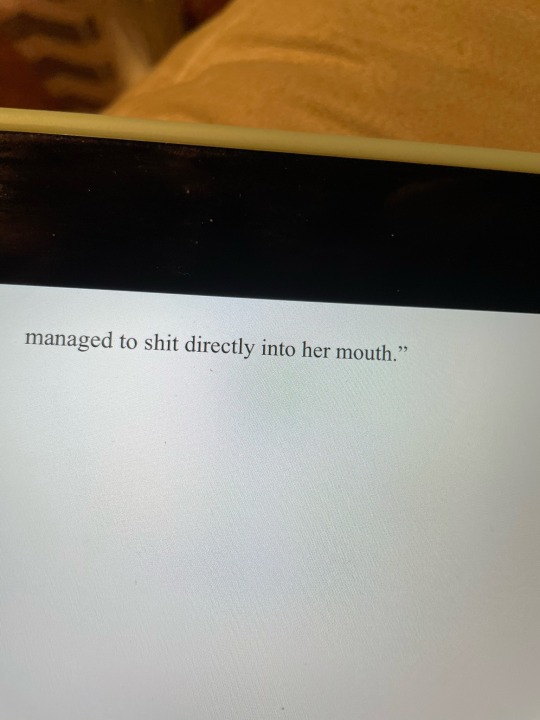
44 notes
·
View notes
Text
Totally Random Non-Fiction Tuesday
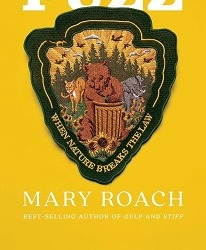
This is another fun Mary Roach non-fiction book. This time about the places (and times) that humans and wildlife collide. Roach goes all over the world, from indoor elephants, to bears, to terrifying leopards. And, I’m not sure that it’s a spoiler, but, a lot of the time, these issues that humans are having with animals, it’s not the animals fault, but ours.
Just like her other books, it has a good balance of information (oh so much information) and humor throughout the book. It was a fun read. Also, laser scarecrows??
You may like this book If you Liked: Are We Smart Enough To Know How Smart Animals Are? by F.B.M. de Waal, Poached by Rachel Nuwer, or Animals Strike Curious Poses by Elena Passarello
Fuzz: When Nature Breaks the Law by Mary Roach
#totallyrandomnonfictuesday#nmlRA#nevins memorial library#fuzz when nature breaks the law#fuzz#mary roach
3 notes
·
View notes
Text
not related to my blog but i somehow have a feeling some people who follow me may be into this - i just found out that jonathan davis of korn was studying mortuary science before korn took off, and he was a mortician’s apprentice at a morgue for a bit. not only is that awesome and weird, but I also found out he recently did a podcast with mary roach, the author of stiff: the curious lives of human cadavers. i fucking love that book! and i love jonathan davis & korn!!
so yeah, listening to that now, it’s 45 minutes. here’s the link!
#personal#korn#jonathan davis#mary roach#stiff: the curious lives of human cadavers#stiff book#mortuary science#mortician
38 notes
·
View notes
Text
Books I Read In August
38. When the Tiger Came Down The Mountain by Nghi Vo
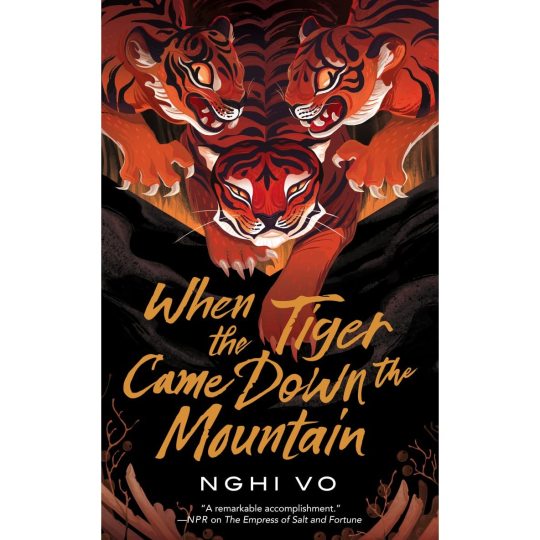
I’m an increasingly big fan of Vo’s work. The Empress of Salt and Fortune was good, but honestly didn’t really stick with me nearly as much as this did.
Part of that is just the increased centrality of the framing device, honestly. I mean first of all I don’t really tend to have much patience for wish-fulfillment characters, but very hard to overstate how much Chih is just living the dream life (and my university indoctrination was thorough enough that the association of the study/preservation/gathering of history and sacredness seems very right and fitting to me.
Also, I just absolutely adore when the story makes a thing of unreliable narrators. Like, when someone’s telling a story and as the scene’s ending someone else interrupts and goes “You’re telling it all wrong!” and gives a completely different version that’s at least as biased in another direction? Poetry.
The actual myth with the lesbian romance and the were-tiger warlord and stuff was also a lot of fun don’t get me wrong, but like, would have been a bit forgettable without the framing device stuff around it.
Anyway, give Chih a tv show. Or at least a half dozen more novellas like this.
39. Deaf Republic by Ilya Kaminsky
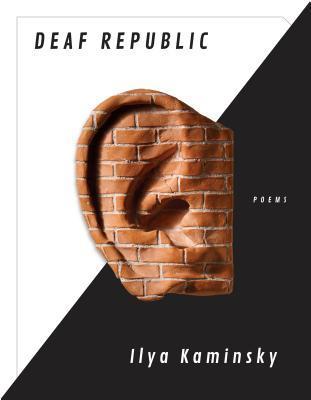
This is the first actual full book of poetry I’ve read….I mean ever, probably, if we’re taking cover to cover. Certainly since I finished high school. So there’s some Culture achieved.
I was…not especially impressed, if I’m being entirely honest? Or, properly - “We Lived Happily During The War '' and “In A Time of Peace '' were both really affecting, but also I had already read both (posted here on tumblr, actually). They’re what sold me on the book. Everything between them did, well, not really live up to it?
I mean, I’m sure that there’s all manner of genius in craft and stuff that flew right over my head, but it just seemed so focused on being clever with line breaks that it failed to do much else. Like, most of the books on the list have plenty of lines that are more poetic by my (doubtlessly irredeemably philistine) definition than any of the poems that made up the middle of the book.
40. The Yiddish Policemen’s Union by Michael Chabon
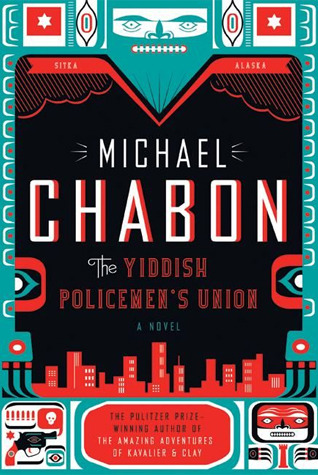
I honestly forget where I first heard about this book, but it’s been very vaguely sitting on my mental tbr list for the last few years,and the library happened to have it in, so.
Anyway, the conceit (an alternate history where WW2 went slightly differently, and also Israel lost in 1947, and through a bunch of political compromises there ended up being an autonomous federal district carved out in Alaska as a temporary national home for the Jewish people - ‘temporary’ meaning expiring on the near year as the novel takes place) is just fascinating, and Chabon had a lot of fun with little offhand references to how different the rest of the world has gotten, too. The fact that everyone speaks Yiddish but with occasional catch phrases and curses called out as being said in American was cute, too.
The story itself was just incredibly, almost painfully noir - genius of a police detective with a ruined marriage, crippling alcoholism, and no future is woken up in the middle of the night because a heroin addict who boards in the same hotel as him was found dead by gunshot, discovers that the victim was the firstborn son of a prominent underworld/religious authority, disowned and ostracized for being gay, through this he stumbles into a sinister conspiracy involving the CIA and the death of his sister. He can’t stop the conspiracy but he might just be able to get justice for the murder, etc, etc. The commitment to the genre is fun,but the late night diners and descriptions of hangovers do begin to get old eventually.
It was also kind of dated, in an interesting way? Like, the Federal government spooks being clean cut bible college boys, all polite and well mannered and sincere Christian Zionists trying to get America into a war to help bring about the End Times, really feels like the sort of thing that only gets written during the Bush Administration. (The single tragic too-good-for-the-world dead heroine addict gay guy and the constant jokes about every less-than-perfectly-feminine woman being mistaken for a lesbian, also somewhat dated).
Anyway, think my vocabulary of random Yiddish words about doubled from reading this, and also many themes about Judaism that I am not even slightly qualified to comment on.
41: Rogue Protocol by Martha Wells
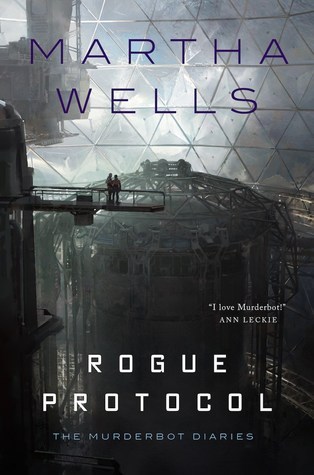
This books are so fun. And just about perfectly bite-sized, too.
Or tv episode sized, really - each has about the perfect amount of plot for an hour long episode of network tv, I think. Pity they’re basically unadaptable.
Anyway, not too much to say about this, really, except that Murderbot’s complete inability to understand their own emotions would probably be annoying by now if it wasn’t so funny, and reading it really left a grin on my face.
Or well, also, I do really enjoy all the little hints that the ‘corporate rim’ is actually kind of a galactic shithole, and Murderbot just treats it like the hegemonic default because its all they know. Certainly nowhere else seems to be nearly as bad about synthetic life (nowhere’s exactly good either, mind, but).
42. Radiance by Catherynne Valente
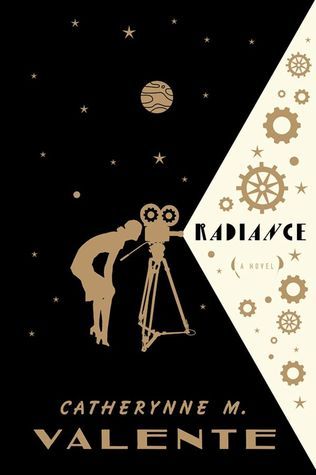
Oh I adored this book.
I mean in large part because I’m a big fan of Valente’s prose when she gets all grandiloquent, and also the basic aesthetic of the setting (High Victorian Space Age by way of the Golden Age of Hollywood on the moon) is just utter catnip to me. But the whole epistolary pretension, telling the story through interviews after the fact and remaining scraps of documentary footage and different drafts of a dramatization made a decade latter that are each completely different genres and occasional clips of Severin’s previous films?
It’s all just showing off to an incredible degree and I’m sure if I didn’t love the book I’d find it unbearably pretentious, but I do, so it’s absolutely great.
The amateur historian in me was kind of irked by the sort of political stasis - it does the fallout thing where the fin de siecle kind of just continues uninterrupted for another fifty years bit with stranger and more wondrous tech, the apocalypse of the Great War put off by all the virgin lands to colonize and everything just kind of continuing as it was (except for the development of the film industry). But that’s kind of a theme. (Much more minorly, the world only seems to have gotten weird in the late 19th century, except that there are sovereign and internationally significant Seneca and Iroquois nations that get mentioned several times, which kind of require a fundamental change to the nature of the American state significantly before then.)
The ending also didn’t really land for me - anything about infinite multiverses honestly makes it difficult for me to stay invested, and anything where the fictional setting tries to encompass/include the ‘real world’ almost always loses me instantly (qualified exception for actual portal fantasy, if it’s good. But introducing the real world in the third act has basically only ever worked for me exactly once).
Which is a pity, because aside from those bits the ending could have been designed to appeal to me in a lab. Was so close to perfection.
43. How to Invent Everything by Ryan North

I took a three week break in the middle, so this technically took me a full calendar month to read. Library was getting pretty angry.
Anyway, I think I said it before but I stand by it - this book would be a significant improvement over the majority of currently existing middle/high school science curriculums. (In the same way that Magic School Bus and Bill Nye taught me more than science class ever did until high school (and even then)).
Anyway, did pick up a lot of interesting trivia, and the author is apparently the dinosaur comics guy(?), which really shows through in the writing (not ALL the jokes come anywhere close to landing, but the ones that don’t are mostly dad-joke like enough that it’s kind of endearing).
Also learned the exact limits of my understanding in (in decreasing order of) mechanical engineering, electricity, and computers. (I really do need someone to gently take me by the hand at some point and explain how basic logic gates doing addition and subtraction ends up with, well, tumblr, or triple A video games, or any of it. Like on a mechanical level.)
Anyway, I should take up sewing. And write the half-essay floating around my head about how horrible mines are and how morally uncomfortable that is.
44. Stiff: The Curious Life of Human Cadavers, by Mary Roach
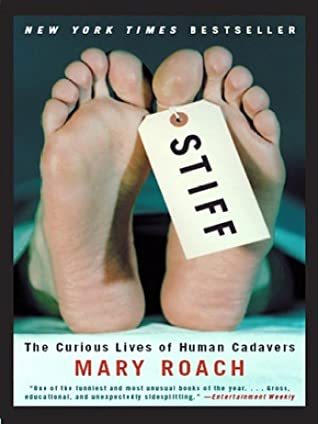
Okay I forget who on here recommended this to me, but thanks! Was a ton of fun, great light morbid summer read.
Roach has a great sort of chatty style, and she does the thing I normally rather dislike working personal anecdotes and descriptions of people she interviewed into everything, but she honestly actually makes it work.
It came out in the early 2000s and was endearingly dated at times, and vaguely racist in a ‘the strange and exotic Orient!’ way at others, but like generally mostly holds up, I think?
It’s not nearly as difficult a read as you’d expect given the subject matter (‘the human corpse, how it decays, and things we do to it’, essentially). Or, well,that might me a be mostly a me thing, but I found it a trove of fun trivia, anyway.
(The one exception being the section on the history of the pursuit of the human head transplant, and specifically the animal experiments done on the subject. That made me more queasy than anything I can remember reading recently, which is I suppose a useful thing to know about myself.)
#monthly tally#book review#analysis/review#when the tiger came down the mountain#nghi vo#Deaf Republic#ilya kaminsky#The Yiddish Policemen's Union#michael chabon#rogue protocol#Murderbot#Martha Wells#Radiance#Catherynne Valente#How to Invent Everything#Ryan North#Stiff#Mary Roach
79 notes
·
View notes
Text
"We live in a culture in which, more and more, people live through simulations.... No one goes out to play anymore. Simulation is becoming reality.
"But it isn't anything like reality. Ask an M.D. who spent a year dissecting a human form tendon by gland by nerve, whether learning anatomy on a computer simulation would be comparable. Ask an astronaut whether taking part in a space simulation is anything like being in space. What's different? Sweat, risk, uncertainty, inconvenience. But also, awe. Pride. Something ineffably splendid and stirring....
"I see a back-handed nobility in excessive, impractical outlays of cash prompted by nothing loftier than a species joining hands and saying 'I bet we can do this.' Yes, the money could be better spent on Earth. But would it? Since when has money saved by government red-lining been spent on education and cancer research? It is always squandered. Let's squander some on Mars. Let's go out and play."
--Packing for Mar: The Curious Science of Life in the Void, Mary Roach
9 notes
·
View notes
Text
Anatomists came to occupy the same terrain, in the public's mind, as executioners. Worse, even, as dissection was thought of, literally, as a punishment worse than death. Indeed that - not the support and assistance of anatomists - was the authorities main intent in making criminals' bodies available for dissection. With so many relatively minor offenses punishable by death, the legal bodies felt the need to tack on added horrors as deterrent against weightier crimes. If you stole a pig, you were hanged. If you killed a man, you were hanged and then dissected.
Stiff: The Curious Lives of Human Cadavers, by Mary Roach
41 notes
·
View notes
Text

Just got these books in the mail. I'll have to add them to my ever-growing "to read" pile. I highly recommend the site thriftbooks. I got these two for just sixteen dollars with free shipping, and they arrived in less than a week.
Mary Roach also wrote Stiff, which was my first literary introduction to mortuary science. My copy of that book is very well-loved and annotated, so I'm excited to get into this one.
5 notes
·
View notes
Text
Quando la natura reagisce alla prepotenza dell’uomo e infrange le sue leggi
da redazione
Mary Roach nelle foreste tra Stati Uniti e Canada
Come comportarsi quando un alce ci attraversa la strada? Quando sorprendiamo un orso entrare in casa? O ci troviamo di fronte a un albero “pericoloso”?
Non siamo mai stati troppo bravi, come specie, a condividere il Pianeta… Nell’antichità, quando gli animali “infrangevano la legge” venivano affidati ad avvocati e portati a…

View On WordPress
#italia#leggere#libri#politica#Aboca#animali#caccia#fauna#libro#lupi#Mary Roach#montagna#natura#orsi#orso#romanzo#runner#society#Trentino#turismo#Wanted
2 notes
·
View notes
Text
Naturalists were the original biologists, and hunters and trappers were the original naturalists. No one knew more about a species -- the wheres, whens, and whys of its movements through the land and the seasons, its relationships with prey and rivals and mates-- than a person whose livelihood depended on that knowledge.
actually all these no-nonsense wildlife professionals in fuzz are making me want to take another shot at writing muldoon
#sigma reads#fuzz#mary roach#take a look it's in a book#...#fanfic i want to be better at you#robert muldoon and his very short shorts
2 notes
·
View notes
Text
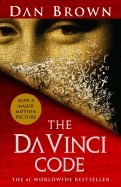
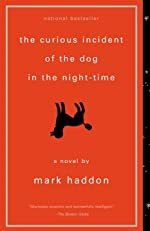
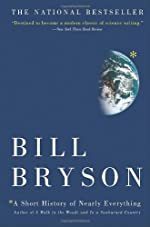
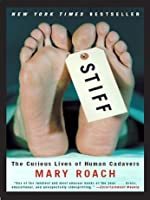
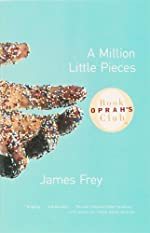

Most Popular Books Published in 2003 [That I've Read] | GoodReads
3 | The DaVinci Code - Dan Brown
4 | The Curious Incident of the Dog in the Night-time - Mark Haddon
7 | A Short History of Nearly Everything - Bill Bryson
11 | Stiff - Mary Roach
18 | A Million Little Pieces - James Frey
34 | Moloka'i - Alan Brennert
#2003 books#books of 2003#books published in 2003#most popular books#the davinci code#dan brown#the curious incident of the dog in the night time#mark haddon#a short history of nearly everything#bill bryson#stiff#mary roach#a million little pieces#james frey#moloka'i#alan brennert
2 notes
·
View notes
Text
"At breeding colonies, herring gulls will sometimes peck to death another gull's chick should it blunder into their territory. And then they, or another gull, may eat is. I read all about this in 'Cannibalism in Herring Gulls,' an article by Jasper Parsons, who watched a lot of it go down on Scotland's Isle of May. I showed off my new vocabulary word: kronism, the eating of one's offspring. They also do that....
"While 20 to 30 percent of herring gull chicks that wander away from their nest are attacked, a similar number, one study showed, are adopted by a neighbor who feeds and protects them. As with humans, as with bears, a few individuals are responsible for the bulk of the species' churlish (to us) behavior. Of the 329 herring gull chicks cannibalized during the 1968 Isle of May breeding season, 167 were eaten by just four cannibals. According to Parsons, one out of 250 herring gull pairs practices cannibalism. It has nothing to do with food shortages, he found. It just seemed to be what they liked to eat best."
-- Fuzz: When Nature Breaks the Law, Mary Roach
#tw animal death#anti gull propaganda hour#sike! it's actually always anti gull propaganda hour here. anti gull propaganda life.#mary roach#cannibalism#? I feel like there are definitely some content warnings this should have but lord knows what#i tried so so hard to read this chapter with an open mind. trying so hard to be fair to these terrible birds#but the chapter literally reads like 'herring gulls are devoted parents! the males help too! this is not typical for birds!'#and then like literally the next page you get more of this#i also had to sticky note over the picture that starts this chapter bc i Never want to see it again#ink post#quotes
5 notes
·
View notes

